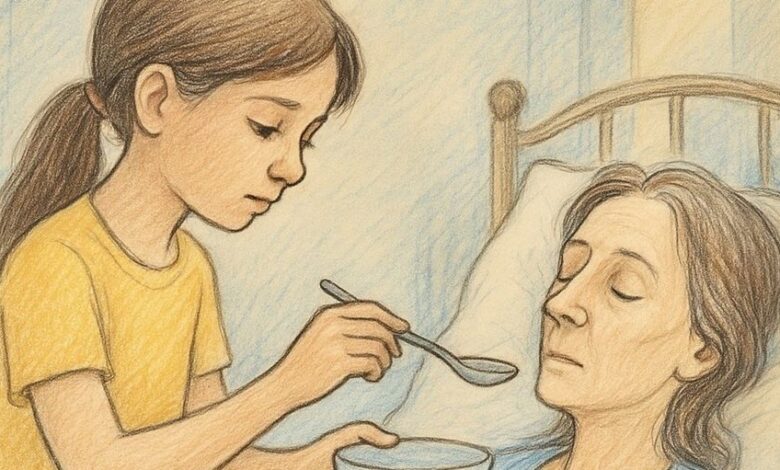The responsibilities of old age .. children between school books and the loads of ABA’s sponsorship …


Amman -13 -Salma, in a neighborhood of Amman, stands with sclerosis at the end of her mother’s bed, and a spoonful of tenderness and silence. She wipes her mouth with a wet handkerchief, and then she rushes to the kitchen to wash the dishes before she begins to perform school duties.
He says: “I am a nurse for my mother and at the same time as her daughter,” she says with a shy smile and what she is doing.
In the life of Salma, it is to take care of most of the time; His mother is unable to perform homework, and is satisfied with helping them by talking and guiding them. As for her father, she returns home late from her job, and she was found by an elderly and sick woman, and she could not help in some simple things.
Salma concludes her speech: “I love my mother. She did a lot of things to me. Helping me for guidance … This is what you can.”
But the truth is completely different, is one of the hundreds of children in Salma Jordan, perhaps in the Arab world, quietly, without adequate social awareness, for patients, elderly, or homeless people who are defective in the house.
Experts of these children call “shadow children” because they live a childhood suspended between playing and extreme responsibilities.
The reasons for the presence of these children differ in this unfamiliar role. In many cases, the family does not have a limited income and the ability to bring a nurse or career, or one of the parents may not be able to withstand the psychological and physical burden, so he sought an elderly child to help.
Socialist Dr. Hussein Gaza believes that the presence of the child is a disadvantage in distributing social roles, and as a result, the Silence Culture on Social Security Organizations, as well as the fall of social unity, as well as the roles imposed by situations.
Gaza also says: “What is happening with children with children is a peaceful decrease in their childhood because it carries that adults sometimes do not tolerate, and it leads to a gradual psychological and social disorders, such as anxiety, guilt and loneliness, such as anxiety, guilt and loneliness.
In Iripit, a 14 -year -old child takes care of her father who has been involved in kidney failure for three years, with him to come to the hospital for dialysis sessions three times a week, when he has to shower him or do special things.
Muhammad shows tired, especially with his academic obligations, but he is preparing it for him, and is interested in helping his mother because he is responsible for her. He also says that he does not complain to his friends, because he finds that it is difficult for them to understand what he is doing, or one of his units will not be allowed to interfere or help, after they feel angry because they intervene in their lives.
The psychological and educational counselor Al -Kilani’s pioneer confirms that the child is responsible for maintaining an elder who put him under his age, and directly affects his emotional and social development.
Al -Qilani explains that this group of children is often affected by internal conflicts, between the love of the parent and the feeling of their loss. They do not openly express rejection, but they lose their ability to enjoy their childhood naturally.
He continues: “One of the most important issues we find in psychological clinics: the difficulty of condemning, failure to read, and the difficulty of creating uniform social relations, all of which fail to empty these negative feelings in a healthy way.”
In Britain, the child (young caregiver) knows that he is under 18 and gives us regular support to the sick or disabled family.
In this context, the government provides psychological and educational support programs and consultations for families that include children.
In Arab communities, he often does not recognize the presence of this group. There are no official statistics or custom plans, and the child often considers the “justice with parents” or “natural home help”, which prevents them from talking seriously about the need to protect these children from the effects of this role.
Dr. Hussein Kasai emphasizes that this children’s group begins with the social recognition of the group, followed by the need to establish support sections within schools and social development centers, aimed at revealing the burden of children who are not inappropriate with their age. It emphasizes the importance of amendment of some family and social policies to provide reliable professional care alternatives.
For its part, Psychology and Educational Advisor Al -Kilani advises these children to provide safe places to share their experiences to these children, by emptying the activities such as collective psychological support sessions, or by emptying the activities such as drawing and interactive games, training on how to regenerate the child.
Al -Qilani says: “Many of these children do not see someone to listen because they do not dare to complain. They think it is a kind of betrayal, or weakness to be hidden.”
With this silence, the suffering of “shadow children” continues outside the light.
